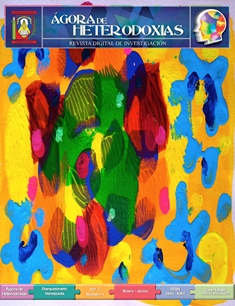Monitoring of good business practices for the fulfillment of the Sustainable Development Goals. An exploratory study, Sonora, México
DOI:
https://doi.org/10.5281/zenodo6480578Keywords:
2030 agenda, sustainable development, small and medium enterprises, sustainable development goals.Abstract
The Sustainable Development Goals are a planning and monitoring tool for most countries, since they constitute a guide to advance towards a sustainable, inclusive and harmonious development with the environment, through the implementation of public policies and the participation of all sectors of society. Therefore, this research aims to develop a mapping of good practices for compliance with these by Mexican companies located in a municipality in the state of Sonora, Mexico. To achieve this, a random sample of 379 MSMEs and a methodology with a quantitative approach, descriptive and transactional design were used. The instrument evaluated the dimensions of society, prevention, environment and, economy. The data was analyzed in a descriptive and multivariate way and the degree of satisfaction was measured based on compliance with the policies inherent to sustainable development. The results show that the cause that has hindered the implementation of the Sustainable Development Goals in companies has been the lack of more effective monitoring strategies in business and institutional management, in order to facilitate access and promote information related to the 2030 Agenda
Downloads
References
Alom, F., Abdullah, M.A., Moten, A.R. & Azam, S.M.F. (2016). Success factors of overall improvement of microenterprises in Malaysia: an empirical study. Journal of Global Entrepreneurship Research, 6(1), 1-13. https://doi.org/10.1186/s40497-016-0050-2
Alonso, J.A., Huitrón, A., & Santander, G. (2017). Iberoamérica y los Objetivos de Desarrollo Sostenible: Secretaría General Iberoamericana
.
Cronbach, L.J. (1951). Coefficient alpha and internal structure of tests. Psychometrika, (16), 297-334. https://doi.org/10.1007/bf02310555
Diario Oficial de la Federación, DOF. (2009). ACUERDO por el que se establece la estratificación de las micro, pequeñas y medianas empresas. http://dof.gob.mx/nota_detalle.php?codigo=5096849&fecha=30/06/2009
Directorio Estadístico Nacional de Unidad Económicas, DENUE. (2020). Directorio de micro, pequeñas y medianas empresas del Instituto Nacional de Estadística y Geografía (INEGI). https://www.inegi.org.mx/app/mapa/denue/
Hernández-Sampieri, R., Fernández-Collado, C., & Baptista-Lucio, M. (2016). Metodología de la investigación. Mc-Graw Hill Educación.
Huitrón-Morales, A. (2018). La contribución de la CSS en el cumplimiento de la Agenda 2030. La experiencia de México en los años 2014 y 2016. Revista Internacional de Cooperación y Desarrollo, 5(2), 25-46. https://doi.org/10.21500/23825014.3913
Merino, C., Navarro, J. & García-Ramírez, W. (2014). Revisión de la consistencia interna del inventario de inteligencia emocional de Bar-On, EQ-I: YV. Revista Peruana de Psicología y Trabajo Social, 3(1), 141-154. https://doi.org/10.13140/2.1.2293.7284
Meza-Rivera, E. (2019). El rol del sector empresarial en el logro de los Objetivos de Desarrollo Sostenible. Una aproximación a la contribución de las empresas del sector petróleo y gas de América Latina durante el primer año de implementación de la Agenda 2030. E-DHC, Quaderns Electrònics sobre el Desenvolupament Humà i la Cooperació, (9), 68-85.
MiesesGlobal (2019). Autoevaluación de la cultura de excelencia empresarial® para un Desarrollo Sostenible y Saludable. http://www.miesesglobal.org
Muñoz-Torres, M. J., Fernández-Izquierdo, M.A., Rivera-Lirio, J.M., Ferrero-Ferrero, I., Escrig- Olmedo, E., Gisbert-Navarro, J.V. & Chiara-Marullo, M. (2018). An assessment tool to integrate sustainability principles into the global supply chain. Sustainability, 10(2), 535. https://doi.org/10.3390/su10020535
Naciones Unidas. (2018). La Agenda 2030 y los Objetivos de Desarrollo Sostenible: una oportunidad para América Latina y el Caribe: Naciones Unidas. https://repositorio.cepal.org/handle/11362/40155
Naciones Unidas México. (2020). Objetivos de Desarrollo del Milenio. Organización de las Naciones Unidas: Organización de las Naciones Unidas. https://www.onu.org.mx/agenda-2030/objetivos-de-desarrollo-del-milenio/
Organización de las Naciones Unidas, ONU. (2020). Transformar nuestro mundo: la Agenda 2030 para el Desarrollo Sostenible. Asamblea General de las Naciones Unidas. http://www.un.org/ga/search/view_doc.asp?symbol=A/70/L.1&Lang=S
Ormaza-Andrade, J., Ochoa-Crespo, J., Ramírez-Valarezo, F. & Quevedo-Vázquez, J. (2020). Responsabilidad social empresarial en el Ecuador: abordaje desde la Agenda 2030. Revista de Ciencias Sociales, 26(3), 175-193. https://doi.org/10.31876/rcs.v26i3.33241
PricewaterhouseCoopers, PwC (2018). Informe anual 2018. https://www.pwc.es/es/publicaciones/sostenibilidad/empresas-desafio-ods.html
PricewaterhouseCoopers, PwC (2015). PwC SDG engagement survey: “make it your business: engaging with the sustainable development goals” de PricewaterhouseCoopers. http://pwc.to/1Pg37JX
Rosati, F., & Faria, L. G. D. (2019). Business contribution to the sustainable development agenda: organizational factors related to early adoption of SDG reporting. Corporate Social Responsibility and Environmental Management, 26(3), 588-597. https://doi.org/10.1002/csr.1705
Santesmases-Mestre, M. A. (2009). Marketing: conceptos y estrategias. Editorial Pirámide.
Published
How to Cite
Issue
Section
Copyright (c) 2022 Luis Enrique Ibarra-Morales, Daniel Paredes-Zempual, Michaelene Huerta-Dueñas

This work is licensed under a Creative Commons Attribution-NonCommercial-ShareAlike 4.0 International License.
![]() Authors keep their copyrights so articles can be reused for teacher and research purpose. Readers and users can also reuse articles for the same purposes but not for commercial purposes. Ágora de Heterodoxias has no responsibility on information given by collaborators which is not necessarily the point of view of the publication
Authors keep their copyrights so articles can be reused for teacher and research purpose. Readers and users can also reuse articles for the same purposes but not for commercial purposes. Ágora de Heterodoxias has no responsibility on information given by collaborators which is not necessarily the point of view of the publication



